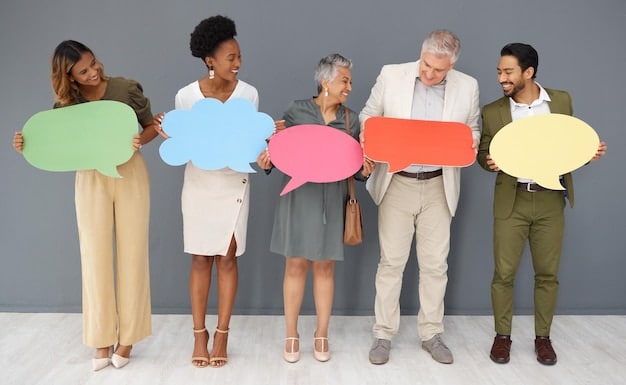Social Media & Polarization: Promoting Civil Discourse Online

Examining the impact of social media on political polarization reveals a concerning trend, but strategies like algorithm reform, media literacy education, and fostering online empathy can potentially promote more civil discourse.
The pervasive influence of social media on modern society extends to the political sphere, where its impact on discourse has become a subject of considerable concern. Examining the impact of social media on political polarization: What strategies can promote more civil discourse? is a crucial question in an era marked by echo chambers and online animosity.
Social Media’s Role in Political Divide
Social media platforms have become primary spaces for political discussion and engagement, but they also contribute to increased political polarization. Understanding how these platforms amplify division is essential for devising strategies to promote more civil discourse.
Echo Chambers and Filter Bubbles
Social media algorithms often create echo chambers and filter bubbles, exposing users primarily to information that confirms their existing beliefs. This limits exposure to diverse perspectives and reinforces polarized viewpoints.
The Spread of Misinformation
The rapid dissemination of misinformation and disinformation on social media can exacerbate political divisions. False or misleading content can influence opinions and fuel animosity between different groups.
- Algorithmic Amplification: Algorithms prioritize engagement, often amplifying sensationalized and polarizing content.
- Lack of Fact-Checking: Many social media platforms lack robust fact-checking mechanisms, allowing misinformation to spread unchecked.
- Emotional Contagion: Social media’s emphasis on emotional reactions can lead to the viral spread of outrage and division.
By understanding how echo chambers, filter bubbles, and misinformation contribute to political polarization, we can begin to explore strategies for promoting more civil discourse on social media.

Strategies for Promoting Civil Discourse
Counteracting the negative impacts of social media on political polarization requires a multifaceted approach. Strategies such as algorithm reform, media literacy education, and fostering online empathy can play a significant role.
Algorithm Reform
Social media platforms should reform their algorithms to prioritize diverse perspectives and reduce the amplification of polarizing content. This could involve promoting posts from a wider range of viewpoints and demoting content flagged as misinformation.
Media Literacy Education
Equipping individuals with media literacy skills can help them critically evaluate information encountered on social media. This includes teaching users how to identify misinformation, assess the credibility of sources, and recognize bias.
Fostering Online Empathy
Promoting empathy and understanding on social media can help bridge divides and encourage more civil discourse. This could involve creating spaces for respectful dialogue, highlighting shared values, and encouraging users to engage with diverse perspectives.
These strategies, when implemented effectively, can contribute to a more constructive and inclusive online environment. It’s essential for social media platforms, educators, and individuals to work together to foster civil discourse.
The Role of Social Media Platforms
Social media platforms bear a significant responsibility in addressing political polarization and promoting civil discourse. Their policies, algorithms, and content moderation practices can significantly influence the online environment.
Content Moderation Policies
Platforms should establish clear and consistent content moderation policies that prohibit hate speech, harassment, and misinformation. Enforcing these policies effectively can help create a safer and more respectful online environment.
Transparency and Accountability
Transparency in algorithmic decision-making and content moderation practices is crucial for building trust with users. Platforms should be accountable for the impact of their policies on political discourse.
Social media platforms have a unique opportunity to shape the online environment in a positive way. By prioritizing civil discourse and implementing effective content moderation policies, they can contribute to a more informed and engaged citizenry.

The Impact of Cancel Culture on Political Discussion
Cancel culture, the practice of publicly boycotting or shaming individuals for perceived offensive or controversial statements, poses a complex challenge to political discourse on social media.
Chilling Effect on Free Speech
The fear of being “canceled” can discourage individuals from expressing their opinions, particularly on sensitive or controversial topics. This can lead to self-censorship and limit the range of perspectives shared online.
Exacerbating Division
Cancel culture often reinforces polarization by creating a climate of intolerance and hostility toward dissenting viewpoints. It can also lead to the demonization of individuals and groups.
Promoting Nuance and Understanding
To mitigate the negative impacts of cancel culture, it’s essential to promote nuance and understanding in online discussions. This involves encouraging respectful dialogue, recognizing the complexity of issues, and avoiding simplistic judgments.
- Context Matters: Consider the context in which a statement was made before issuing a judgment.
- Focus on Dialogue: Engage in respectful dialogue rather than resorting to public shaming.
- Forgiveness and Growth: Allow individuals to learn from their mistakes and demonstrate growth.
Finding the right balance between accountability and free expression is crucial for fostering a healthy political discourse on social media.
The Importance of Critical Thinking
Critical thinking skills are essential for navigating the complex information landscape of social media. By developing these skills, individuals can become more discerning consumers of information and more effective participants in political discussions.
Evaluating Sources
Critical thinkers assess the credibility of sources by considering factors such as the author’s expertise, the publication’s reputation, and the evidence presented.
Identifying Bias
Recognizing bias is crucial for understanding how different perspectives can shape information. Critical thinkers consider the potential biases of sources and seek out diverse viewpoints.
Logical Fallacies
Being aware of common logical fallacies, such as straw man arguments and ad hominem attacks, can help individuals identify and avoid flawed reasoning in political discussions.
Investing in critical thinking education can empower individuals to engage more thoughtfully and constructively in political discourse on social media.
Building Bridges Through Common Ground
Despite the challenges of political polarization on social media, opportunities exist for building bridges and fostering common ground between different groups. By emphasizing shared values and focusing on areas of agreement, individuals can work together to address common challenges.
Highlighting Shared Values
Rather than focusing solely on divisive issues, it’s important to highlight shared values such as community, family, and social justice. This can create a sense of common purpose and foster cooperation across political divides.
Focusing on Local Issues
Addressing local issues, such as improving schools or cleaning up parks, can provide opportunities for individuals from different political backgrounds to work together toward common goals. This can build trust and strengthen community bonds.
Promoting Empathy and Understanding
Engaging in respectful dialogue and seeking to understand different perspectives can help bridge divides and foster empathy. This involves listening actively, asking questions, and avoiding assumptions.
Even in a polarized online environment, individuals can find common ground and build bridges by focusing on shared values, addressing local issues, and promoting empathy and understanding.
| Key Point | Brief Description |
|---|---|
| 📢 Algorithm Reform | Modify algorithms to show diverse viewpoints. |
| 📚 Media Literacy | Educate users to identify misinformation. |
| 🤝 Online Empathy | Promote understanding and respectful dialogue. |
| 🤔 Critical Thinking | Develop skills to evaluate sources and biases. |
FAQ
▼
Social media algorithms often create echo chambers, limiting exposure to diverse viewpoints and reinforcing existing beliefs, which exacerbates political polarization.
▼
Algorithm reform involves changing how social media platforms prioritize content, aiming to reduce the amplification of polarizing content and promoting a wider range of perspectives.
▼
Media literacy education helps individuals critically evaluate information, identify misinformation, and assess sources, enabling them to engage more thoughtfully with political content.
▼
Online empathy can be fostered by creating spaces for respectful dialogue, highlighting shared values, and encouraging users to engage with diverse perspectives to understand different viewpoints.
▼
Social media platforms should establish clear content moderation policies, promote algorithmic transparency, and foster a respectful environment, ensuring accountability for the impact of their policies.
Conclusion
Addressing the impact of social media on political polarization requires a concerted effort from social media platforms, educators, and individuals. By prioritizing algorithm reform, media literacy education, fostering online empathy, and promoting critical thinking, we can work towards a more civil and constructive online environment.





